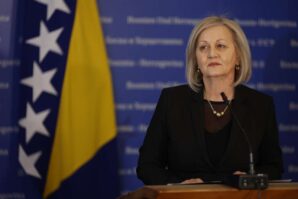 The possibility of new territorial division of BiH, and the merger of the RS and Croatian entities to neighboring countries, is not a real possibility, and not just that, but this idea is controversial for several reasons.
The possibility of new territorial division of BiH, and the merger of the RS and Croatian entities to neighboring countries, is not a real possibility, and not just that, but this idea is controversial for several reasons.
This is reaction of Professor Florian Bieber, director of the Center for the Study of Southeast Europe at the University of Graz, on the analysis done by the Foreign Affairs magazine published by a former British diplomat and former Head of the British Embassy in Banja Luka, Timothy Less.
To recall, Less proposes the establishment of new national states in the Balkans, and then coupling of these states or creation of the so called Great Serbia and Great Croatia at the expense of BiH, which, he said, would result in the final stability and lasting peace in the region.
“Article promotes the thesis that the merger of the independent Republika Srpska (RS) to Serbia, and Croatian territorial units to Croatia, would result in greater stability. He does not offer any solution to the territory where the majority of citizens are Bosniaks. He also does not take into account the question of the fate of minorities, given that about 16 % of the population of the RS, according to the last census, are not Serbs. Also, he does not take into account the fact that many Croats in the FBiH do not live in areas where they are majority or areas that could easily be merged to Croatia. In that sense, he does not take into account the real problem,” said Professor Bieber.
Proposals of Timothy Less, according to Florian Bieber, are problematic from two aspects.
“From a moral perspective, the RS is already ethnically homogeneous because of ethnic cleansing during the war in the 90’s. On the other hand, the only way to realize the idea which he proposes actually means further ethnic cleansing of minorities because they would not be welcomed on the “wrong” side of the borders, which would result in further ethnic cleansing and human rights violations,” said Bieber.
Since Less addresses his proposal on official Washington and the local administration led by President-elect Donald Trump, and professor Bieber does not believe that this proposal will leave a significant effect on US foreign policy.
“I doubt it because I do not think that Donald Trump has any special interest in the Balkans and the acceptance of such a policy would be a huge shift in the US policy in the last 20 years. The Balkans is not a direct American interest and I do not believe that Trump would pay any attention to it when it comes to its foreign policy. I have no reason to believe that Donald Trump was not interested in any kind of foreign policy that would bring more problems than solving the situation. Thus, I do not think that this would be a topic on the agenda of Donald Trump and the United States,” believes director of the Center for the Study of Southeast Europe at the University of Graz, adding that European integration is still the best solution to the issue of stability in countries of the former Yugoslavia.
“We all know that the process of European integration is in a crisis, that it is in a difficult situation, but it does not mean that this process is not the best solution. It just means that the European Union must overcome the crisis and become the engine of change once again. However, this has less to do with the Balkans as there are with the European Union and its current weaknesses,” concluded Professor Bieber.
(Source: faktor.ba)


















